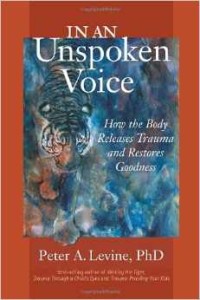
Peter A. Levine
5.0 out of 5 stars Demands Careful Reading, A Capstone Book that Emphasizes BALANCE, April 21, 2014
I read this book at the same time as Cyntia Sue Larson's Quantum Jumps: An Extraordinary Science of Happiness and Prosperity and E. Graham Howe as edited by William Stranger, The Druid of Harley Street: The Spiritual Psychology of E. Graham Howe. In line to be read as part of this series is also Guy Muchie's The Seven Mysteries of Life: An Exploration of Science and Philosophy.
This is by no means an easy read but its bottom-line (bearing in mind that the author has been writing many books on this theme, this is the latest) is clear: Sound Mind in a Sound Body. Others would add Sound Soul and Sound Heart at well. In other words, the mind is carried in the host, the body, and the totality of the nervous system, the skeletal system, the muscle system, the bio-chemical soup system, are all critical to how well the mind functions and how well the mind — including the unconscious — heals in the aftermath of trauma.
I totally embrace the author's emphasis on trauma as injury from which one can recover; on the body as a starting point; and — in his concluding chapter — on three brains (reptilian runs on instinct, mammalian runs on feeling, primate runs on thinking) comprising one mind.
For me the hidden gem late in the book is the assertion that QUOTE (348) “spiritual experience is welded with our most primitive animal instincts.” This follows on a long discourse of the importance of emotions and feelings and the inter-personal and community context within which these exist (or put another way, without friends and without community positive emotions and feelings are hard to come by). I am reminded of Lionel Tiger's The Manufacture of Evil: Ethics, Evolution and the Industrial System — the past 50-100 years have been about the isolation of the individual from family and community, creating mega scale networks in which humans are commoditized and marginalized — the opposite of Kirkpatrick Sale's Human scale or E. F. Schumaker's Small Is Beautiful: Economics as if People Mattered.
For me this book and the three others linked at the top are a new branch of inquiry. My past reading lists, all leading to Amazon, in this general area are easily found by searching for
Worth a Look: Book Reviews on Conscious, Evolutionary, Integral Activism & Goodness
Worth a Look: Book Reviews on Evolutionary Dynamics
This is a very valuable book, ably crafted. It requires more than a light reading, and even multiple readings as well as discussion with others to fully appreciate, so I fear I am not doing it justice in this first review, other than to strongly recommend it. Trauma is a major characteristic of the 20th Century and likely to be characteristic of the 21st Century as well.
I found this book in part because of my interest in refugee trauma. I have put together a list of ten books (nine other than this one) together with covers and highlights, each leading back to its Amazon page, if anyone wants to explore that larger context:
Worth a Look: Books on War and Torture Victims, Asylum and Refugee Trauma
Best wishes to all,
Robert David STEELE Vivas
INTELLIGENCE for EARTH: Clarify, Diversity, Integrity, & Sustainability




